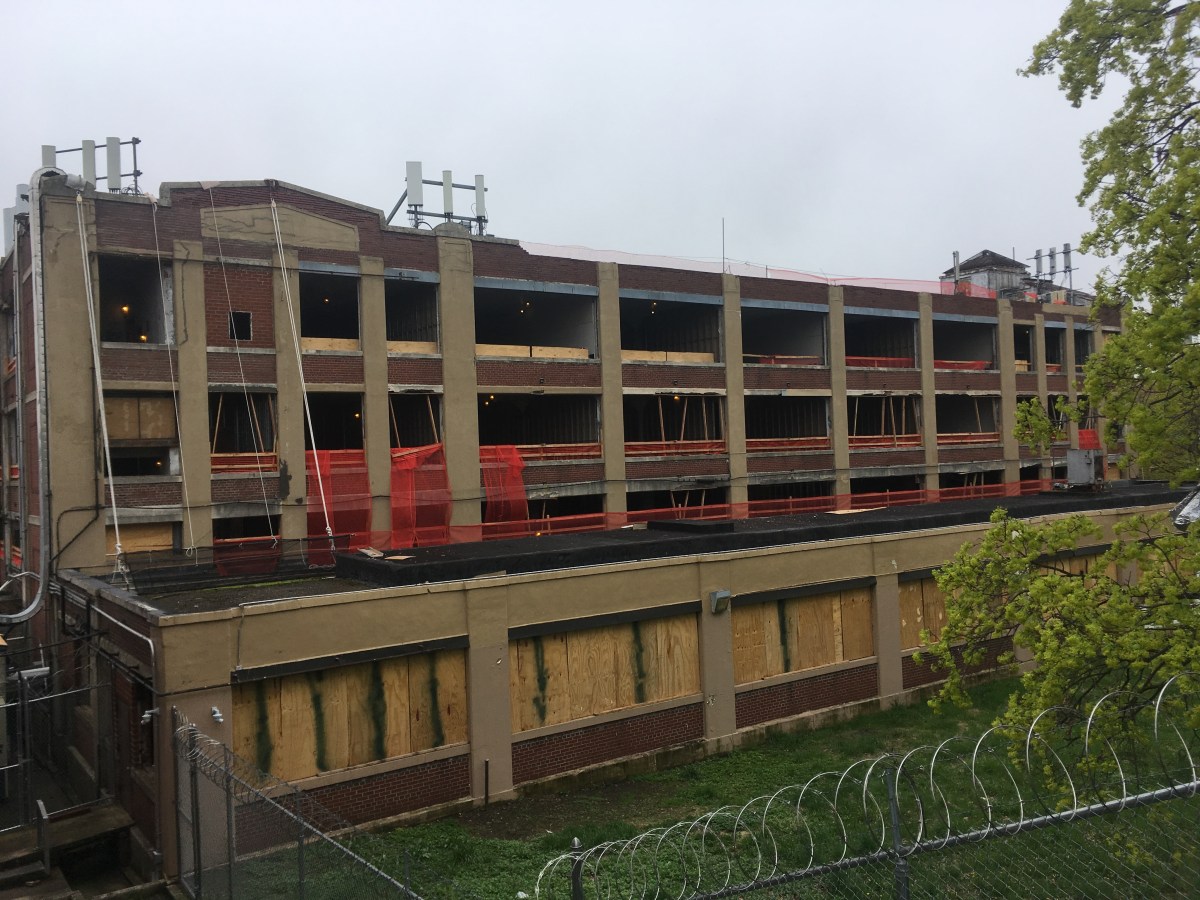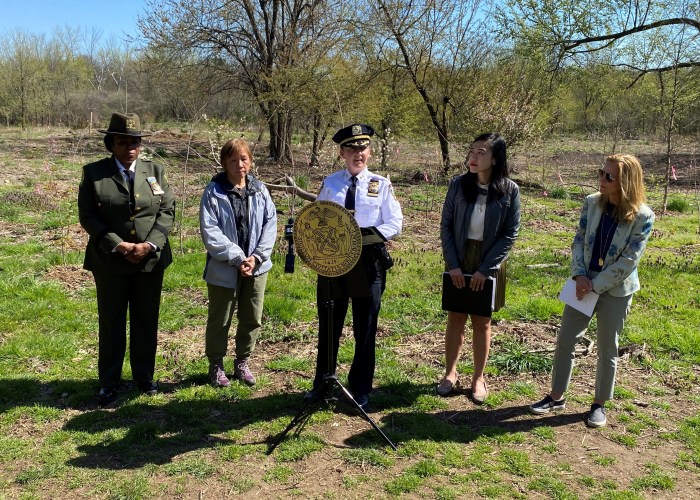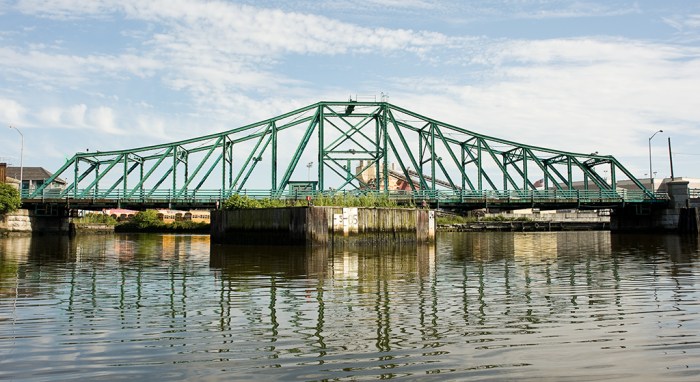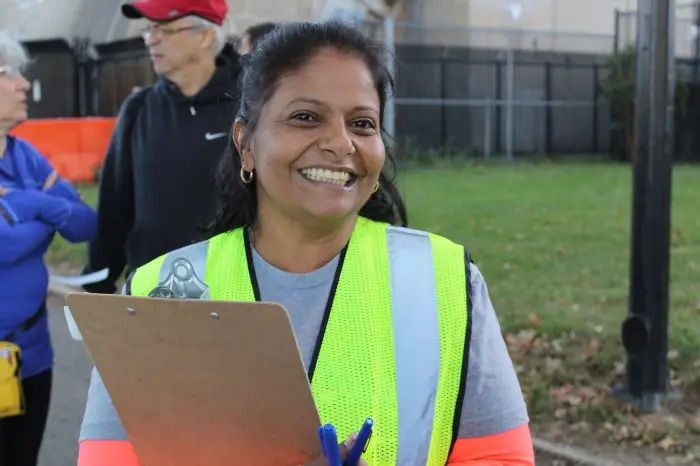Regardless of where one stands on the proposed opening of a Glendale homeless shelter, no one involved in the debate can accuse Mayor Bill de Blasio of not keeping his word.
In March 2017, de Blasio repeatedly stated that the Community Board 5 area in Queens (which encompasses Ridgewood, Glendale, Maspeth and Middle Village) would get a homeless shelter in the near future. The shelter would be constructed as part of his “Turning the Tide on Homelessness” plan, an initiative aimed at reversing the troubling increase in the city’s homeless population.
His remarks came after years of turmoil between City Hall and residents in Glendale and Maspeth, who took to the streets and picketed the placement of homeless individuals in both makeshift and permanent shelters.
“We are going to go back in to that community board, find the best possible location and create a new shelter,” de Blasio said during a March 2017 radio interview. “We are happy to work with elected officials and community leaders to determine the best location if people want to work productively with us. Either way that community board needs to have shelter capacity. Two hundred and fifty people from that community board are in our shelter system. Is it fair to all other communities that those folks would be elsewhere? No.”
As it turns out, the Board 5 area is getting two shelters, as the Department of Homeless Services (DHS) confirmed to QNS on Friday. They plan on opening a family shelter on Summerfield Street in Ridgewood — and a facility for men at 78-16 Cooper Ave. in Glendale, something which the agency has planned for years to great opposition from the community.
For those who’ve observed this on-and-off, seesaw battle in Glendale, it seems obvious as to why so many people are angry about this latest development.
Not in their backyard
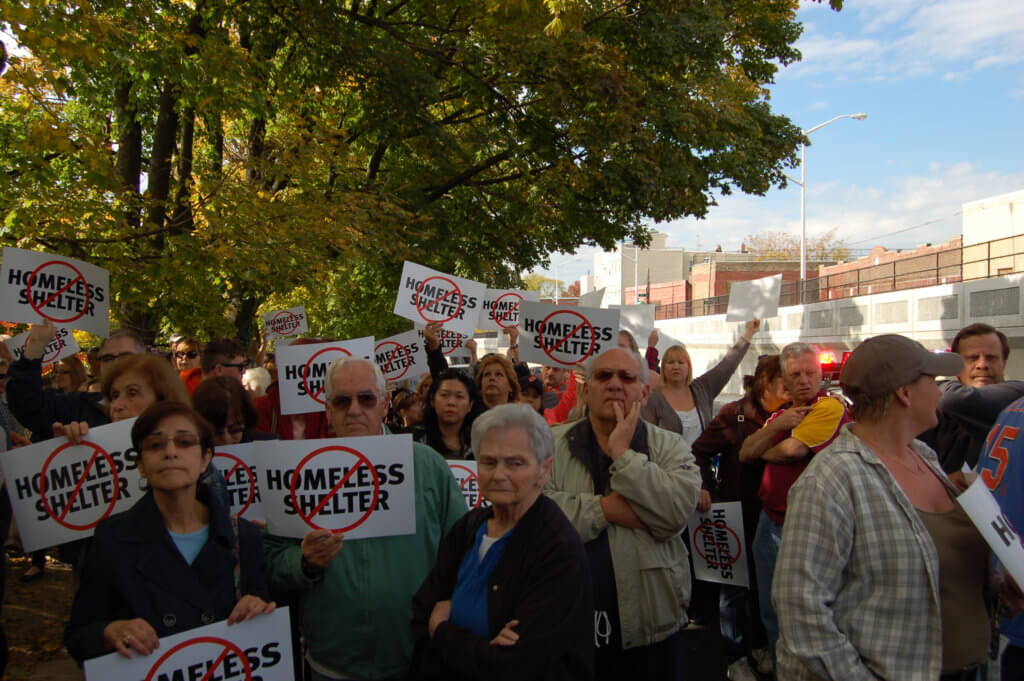
Glendale’s war on the proposed homeless shelter began six years ago this month — as the Bloomberg administration was coming to a close and de Blasio was on the road to victory in that year’s mayoral election.
In August 2013, the DHS announced its intent to take the Cooper Avenue site, a long-vacant factory, and transform it into a homeless shelter for up to 200 men.
The original agreement was reached between the DHS, property owner Michael Wilner and Samaritan Village, a nonprofit shelter operator. (A Westchester County firm named Westhab has been selected to operate the Cooper Avenue shelter under the new plan announced Friday.)
Almost immediately, the community sprung into action, hell-bent on stopping the plan in its tracks. Along with holding protests outside the site, civic-minded residents formed the Glendale-Middle Village Coalition, a group aimed at launching legal action to thwart the proposal. Robert Holden, then-president of the Juniper Park Civic Association and now the area’s City Council representative, was among the members of the ad hoc group.
The coalition argued that the Cooper Avenue site was unfit for a homeless shelter, as the factory itself required extensive renovations and potentially sat upon contaminated land. (The area had, at one point in time, been a hub for industry.) It also abutted a chemical company on 79th Place that further propagated doubts about the site’s overall safety.
In 2014, the coalition filed an Article 78 proceeding against the city contesting a rather favorable environmental review for the Cooper Avenue site. A judge threw out the case a year later, indicating that the agency “seemed to procedurally satisfy the considerations of environmental impact into planning and review,” according to a QNS report.
But within a year, talk of a Glendale shelter began to slow, and the project itself experienced setbacks. In July 2015, the Department of Buildings rejected floor plans for the building’s reconstruction. Work would later proceed once more acceptable plans were approved.
Even so, the DHS began looking elsewhere in the Board 5 area to house homeless men in the community.
The second battlefront
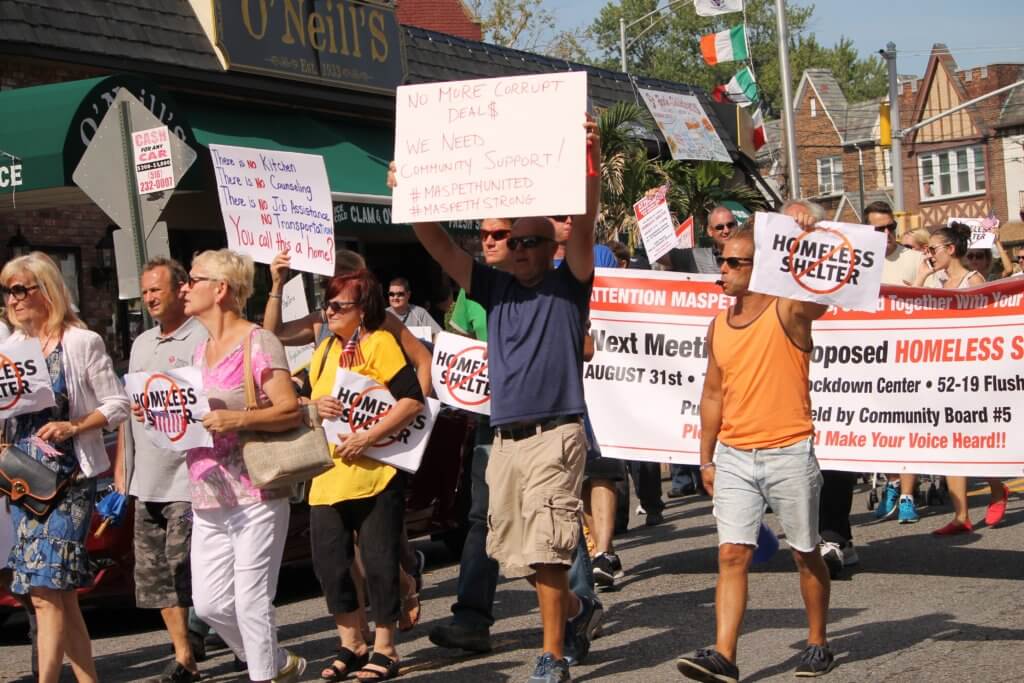
Almost three years after the Glendale plan was announced, in August 2016, news broke that the DHS had plans to convert the Holiday Inn Express hotel on 55th Road in Maspeth into a homeless shelter for men. That sparked a new round of protests in the community which lasted several months.
It also led to a rumor spread through social media and a blog that then-Councilwoman Elizabeth Crowley had struck a secret deal with the DHS to scrap the Glendale shelter plan in favor of the Maspeth proposal. The city and Crowley vehemently denied that rumor; Crowley publicly opposed both plans.
Meanwhile, Holden and the JPCA were on the front lines of the Maspeth shelter war in the summer and fall of 2016, holding nightly protests outside the hotel as well as a march through the community.
Political fallout
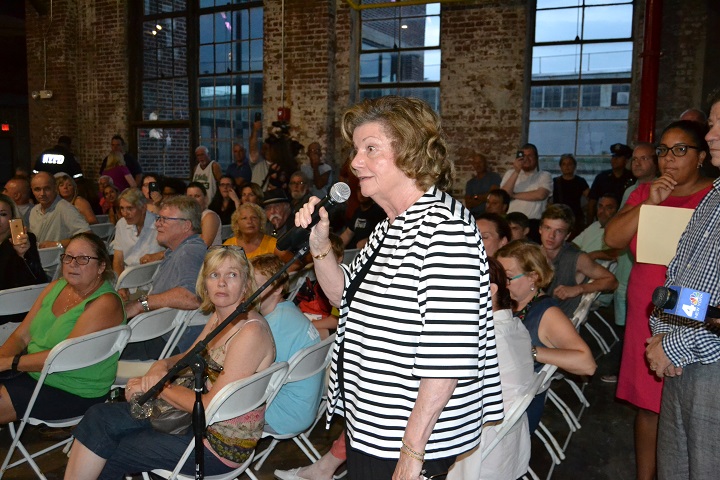
The anger over the Maspeth shelter had repercussions at the polls; that September, nine-term incumbent Assemblywoman Margaret Markey lost her seat in the Democratic primary to attorney Brian Barnwell.
Even though she had publicly announced her opposition to the proposal, Markey had taken flak in the community for failing to show up at rallies and a public meeting. At a special Aug. 31, 2016, meeting of Community Board 5 in Maspeth, she was roundly jeered by the crowd, and cut short her own remarks.
Things finally calmed down in Maspeth in October 2016, when the DHS froze its plan to fully convert the Holiday Inn Express to a permanent homeless shelter. Instead, it opted to move in 30 homeless men on a temporary basis, but that arrangement would continue for nearly three years.
Even as tensions reduced to a mere simmer, residents from Queens continued to protest the use of hotels and residential sites for homeless shelters — at times taking their case to Brooklyn and picketing outside the home of DHS Commissioner Steven Banks.
The political fallout from the shelter war also contributed to Crowley’s defeat in her bid for a third City Council term in 2017.
After unsuccessfully challenging her in the Democratic primary that year, Holden continued his campaign on third-party lines and, later, secured the Republican Party nomination. He wound up narrowly defeating Crowley in the November general election, powered largely by more than 8,000 Republican votes.
Now the area’s most outspoken shelter opponent had an official seat at City Hall representing the communities fighting them.
‘Playing games with City Hall’
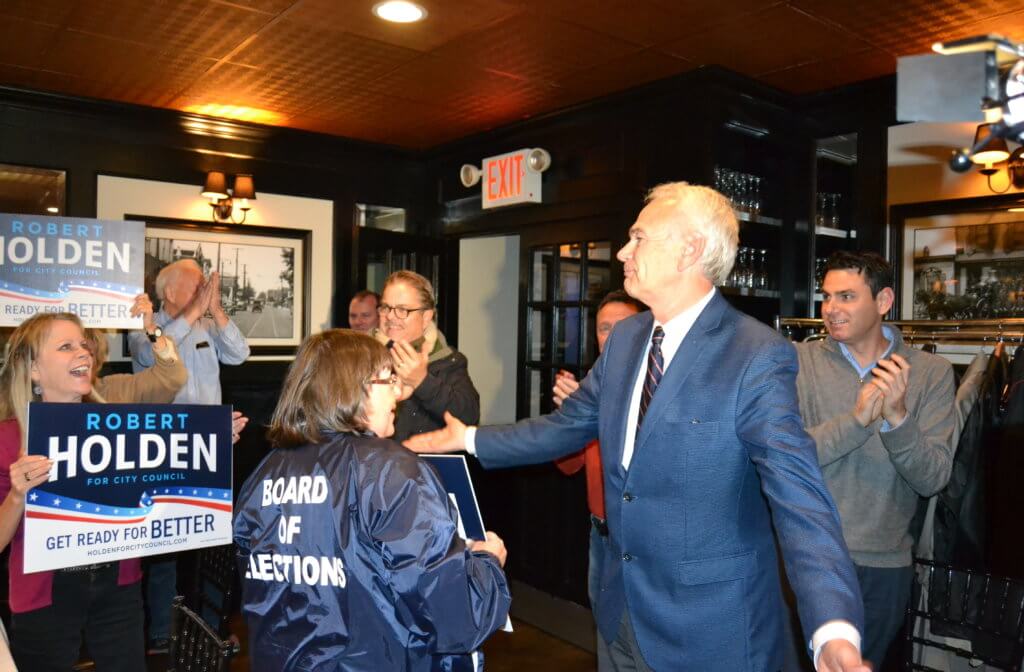
Soon after becoming the area’s new City Council member, Holden seemed to score an early win. The DHS informed him that it no longer had plans to proceed with the Glendale shelter. Seeing further potential for the site, Holden would later pitch the location to the Department of Education as a new public school campus.
But less seven months later, the DHS reversed course again and told Holden they were once again eyeing 78-16 Cooper Ave. as a homeless shelter. Construction work on the site, which had been dormant for years, soon began in earnest — as did the protestations of local civic associations and residents.
Even so, as the construction went on and the rumor mill churned, there was still nothing official from the DHS about the fate of the Glendale site. In March 2019, in addressing speculation within Glendale and Middle Village that the shelter was coming, a Holden spokesperson told QNS that nothing imminent was on the horizon.
“We support our constituents coming together to push back against the property owner, who is only concerned about making money with no regard to the community,” the spokesperson said then. “But ultimately it is not up to the property owner if a shelter is going there or not. It’s up to the city, and there has been no contract for a shelter put forth by the city. The councilman continues to push for a school at the location and is regularly communicating with the relevant city agencies.”
That comment came ahead of an April 13 protest by the Glendale Middle Village Coalition on Long Island outside the home of property owner Michael Wilner, which also stopped briefly outside the temple where he was said to be attending sabbath services. Holden was not part of the protest, but did speak with participants after they returned to Queens, and took to social media later to publicly condemn their picket outside Wilner’s temple.
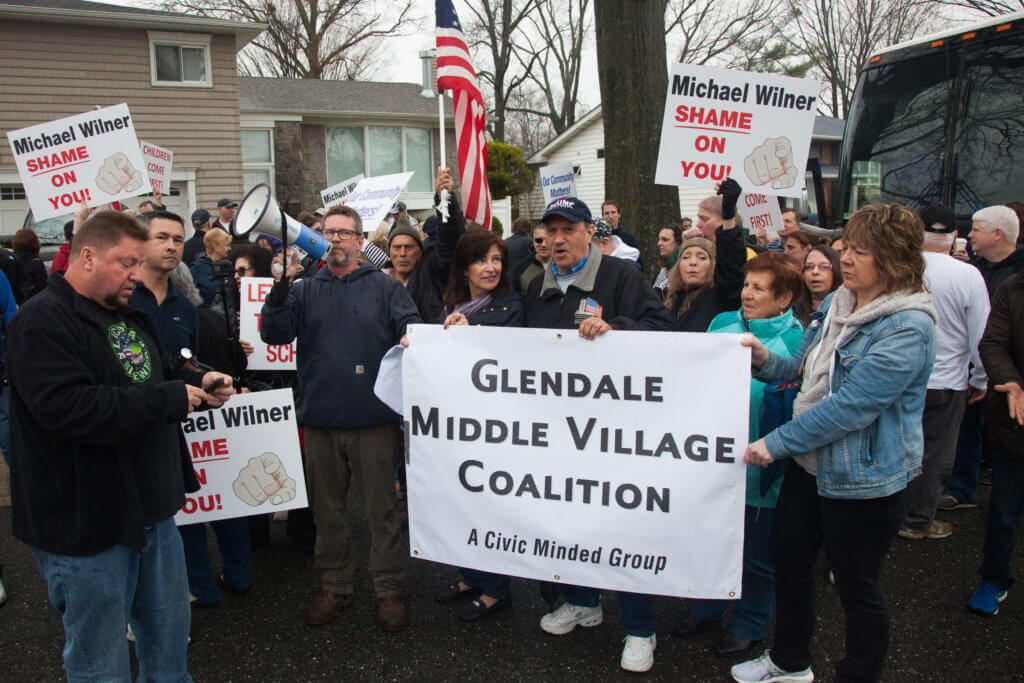
Now that the DHS has announced its intentions for Glendale and Ridgewood, Holden made clear in an Aug. 23 statement that he intends to fight the city tooth and nail.
“I tried to fight against this shelter the right way, by negotiating with city agencies and coming up with reasonable proposals, only to have the rug pulled out from under me,” he said of the Glendale plan. “I was told countless times that DHS and SCA loved my plan to build a new school on Cooper Avenue, and the mayor’s approval was all that was needed. But the mayor recently told me he knew nothing about the plan. I’m sick of playing this game with City Hall, so now I will fight back the best way I know how, with my neighbors by my side.”

